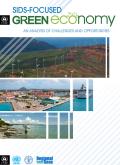Companies are increasingly aware of the need to address climate change. However, while many companies are taking action to address climate change, many others are still lagging behind. This report surveys responsible business practices addressing climate change and driving the shift to a low-carbon economy. It summarises policies, regulations and other instruments in support of alow-carbon economy in OECD countries and emerging economies, and analyses corporate responses to these drivers.
Using the principles of responsible business conduct identified in the OECD Guidelines for Multinational Enterprises, this report reviews three key areas of corporate action:c
- Acounting for greenhouse gas emissions
- Achieving emissions reductions
- Engaging suppliers, consumers and other stakeholders
The Bank of France organised on 21 March 2013 a conference on the theme of “green growth”. This concept implies finding a balance between the environment and growth in order to maximise welfare – present and future. This involves applying a weighing-up approach for the present and future through an appropriate discount rate. Given this discount rate, it is up to decision makers to develop and to implement policies to combat climate change, in the most effective way possible.
To achieve this, it is necessary to develop assessment tools for climate policies. In addition, greater global coordination seems necessary today. Although the main responsibility for the increase in greenhouse gas emissions (GHG ) lies currently with developed countries, if emerging and developing countries follow the same pattern of growth, this could significantly worsen the situation; thus a global agreement is paramount.
On a smaller scale, and in the absence of a binding global agreement for the moment, it is up to everyone to try to be more respectful of the environment and businesses have a role to play in addressing the challenge of sustainable development.
Three different sets of approaches to understanding behaviour with respect to sustainable tourism mobility and consumption are identified in this paper: the utilitarian, social/psychological and the systems of provision/institutional approach. Each is based on different sets of assumptions on the factors that affect consumer sustainability behaviour. These assumptions not only affect the selection of policy tools to change behaviours but are also related to different modes of governance. Assumptions with respect to human behaviour and behavioural change and modes of intervention and governance are interrelated and mutually reinforcing and act as policy paradigms. Failure to recognise the importance of social structures in affecting behaviour has created a path dependency in which solutions to sustainable tourism mobility are only accepted within the dominant governance and behavioural paradigm. Other policy options and academic research that identify structures and institutions in systems of provision as a sustainability problem that requires non-market intervention and/or significant system change are regarded as marginal to the policy process or are ignored.

This working paper summarises output from Project Catalyst, an initiative of the ClimateWorks Foundation, aimed at providing analytical support for the UNFCCC negotiations on a post-Kyoto international climate agreement. It seeks to show how to spread best practice around the world effectively by learning from and building upon the experiences of first-generation low carbon growth plans (LCGPs). Key to each country’s LCGP is the balance between maximising mitigation and adaptation efforts whilst maintaining economic growth necessary to ensure that decades of developmental gains are not rolled back. A data-driven and country-specific LCGP is essential to guaranteeing success in finding this balance. The paper covers how the plans are developed and analysed, citing numerous examples of LCGPs from countries such as Mexico and South Africa.
The paper identifies some commonly shared factors determinant to success:
